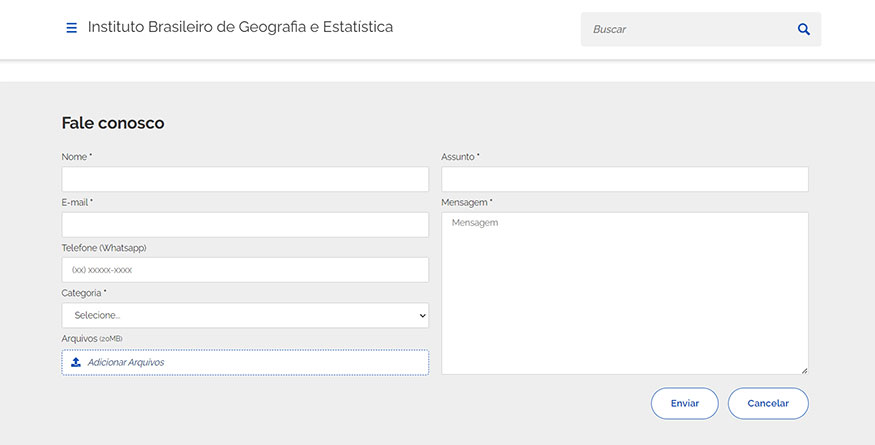IBGE
Contacting the IBGE: Do you know our main communication channels?
July 09, 2024 10h00 AM | Last Updated: August 20, 2024 10h45 PM

For those who want to ask a question about a survey, know the size of their municipality’s population, or even fulfill a demand from the press, the Brazilian Institute of Geography and Statistics (IBGE) makes available a number of communication channels. They receive requests from students, researchers, professor, universities and from the press. Among the most accessed channels are the toll free telephone line, available Every day from 8 am to 9:30 pm, the electronic form (Talk to Us), the Fala.BR System – Access to Information Law (LAI), the IBGE Library customer service and the IBGE Ombudsman.
The IBGE also talks to its users in society by means of the State Superintendencies. Each one of them has a specific address where people are assisted and where they can find information about where to find assistance in each Federation Unit. Click here to see the adresses of Superintendencies in each state.
“The different communication channels are essential for the IBGE to have a dialogue with its varied audience. That allows the Institute to improve its releases and disseminated material, studies, indicators, surveys and documents. In order to fulfill its mission of portraying the reality of Brazil in its many aspects, there is nothing better for the IBGE than listening to society and interacting with it, and our communication channels are essential for this role,” said the coordinator general of the Center for Information Documentation and Dissemination, Daniel Castro.
According to Juarez Filho, manager of the Customer Services Department (GEATE), “the IBGE was a pioneer as it allowed access to a database of aggregated information by means of Telex in the beginning of the 1980’’s. The Center for Information Documentation and Dissemination (CDDI) was formed in 1986 and a while later the Institute created a department to assist users at the CDDI. Some years passed until that sector turned into a specific Department (GEATE)”.
Among the most accessed communication channels is the Electronic Form ("Talk to Us''), which registered 19,236 GEATE calls last year. Through this channel, the citizen opens a call and receives a protocol number, and this demand goes to GEATE's service system. According to GEATE's service manager, Juarez Filho, when the demand is very specific, it is forwarded to the responsible area within the IBGE.
“This channel allows people to have direct contact with the IBGE technical areas. Any questions people have, any information they need, they can contact us directly through our channels," Juarez Filho explained. "In this channel, we receive questions about the population of a given state, the number of establishments and questions about the IBGE surveys, such as the Extended National Consumer Price Index (IPCA-15), the Continuous National Household Sample Survey (Continuous PNAD), among others," he added.

The call center service is available on the toll-free number 0800 721 8181 and began in 2000 to support the Census. This service is provided by the GEATE team and is divided into a menu (IVRs), where each number corresponds to a specific IBGE area. The Center for Information Documentation and Dissemination (CDDI) answers numbers 1 ("Confirm census taker identity"), 5 ("Other surveys"), 6 ("Information for IBGE retirees and pensioners") and 7 ("Other information"). Numbers 2, 3 and 4 belong to the Directorate of Surveys (DPE), and correspond to the cadastral maintenance system. In 2023, this channel received a total of 76,407 calls.
The Access to Information Law (LAI) is a service available on the Fala.Br web portal of the Office of the Comptroller General (CGU). Last year, 1,686 calls were answered. "When a question, which can be sent anonymously, arrives, whether it's from a citizen with doubts about some data from their city, or from a researcher at a University about the IBGE microdata, we have 20 days to answer it. This period can be extended by up to 10 days," explained Emerson Matosino, coordinator of the Coordination of Services and Information (COATI). "The LAI, if used properly, is a way of bringing the IBGE closer to society," added Emerson.
The IBGE Library also provides face-to-face customer service to the public, about publications and maps that are in the Library's collection, and customer service through the Library's website.
In 2023, Danielle Barreiros, manager of the Library, Information and Memory Department (GEBIM), provided services to a total of 568 customers, including visits in person, and help by phone and e-mail. She explained that "the library has been working a lot on information literacy, which allows people to know where the information is, whether it's formed by maps or specific documents that are only available in the library, and to have a critical sense to be able to analyze and check the quality of this information." In-person consultations take place by scheduling an appointment, and the Library sets a deadline of 24-hour for each consultation.
Internal demands from the Institute civil servants are forwarded to the IBGE Ombudsman's Office, which received 2,143 complaints last year. According to Sheila Fonseca, the IBGE ombudsman and head of the Ombudsman's Office, "it is the responsibility of the IBGE Ombudsman's Office to receive and forward suggestions, complaints, denunciations and compliments made by citizens and civil servants, seek solutions, follow up on the measures taken and monitor compliance with the deadlines established". Any citizen can submit a complaint to the IBGE through the Fala Br System - the Integrated Ombudsman and Access to Information Platform. The IBGE Ombudsman's Office can also be accessed via the link available here.
The press contact is made through the email comunica@ibge.gov.br, where journalists and advisors from the Social Communication Coordination (CCS) receive and respond to demands. Inquiries are also received by phone (21) 2142-4651. All the news and press releases published by the Institute are available at IBGE News Agency.
On the main IBGE website, the "Services" section is located on the top left-hand corner, which allows citizens to issue certificates, obtain documents, obtain an IBGE population certificate, among other services offered by the Institute. This area directs the citizen to the Gov.Br website and can be accessed via the link available here.
At the IBGE, there is still the Restricted Data Access Room (SAR), which was created in 2003 with the aim of allowing the study and access of specific data from the Institute. This service is managed by GEATE, but the approval of the project depends on the assessment of the IBGE technical areas and the committee. According to Juarez Filho, the service "is different for researchers who need to work with the IBGE microdata, which are restricted in order to guarantee statistical confidentiality. The researchers work in a closed room with computers that have no access to the internet or anything external. The researcher has access to the terminal, but does not access the server directly".



















